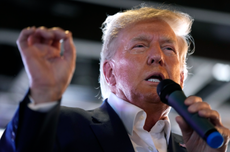The damning phone call that may have led to the downfall of Trump and his cronies
Ex-president’s 2 January phone call with Georgia’s secretary of State earned him two felony counts out of 13
Your support helps us to tell the story
From reproductive rights to climate change to Big Tech, The Independent is on the ground when the story is developing. Whether it's investigating the financials of Elon Musk's pro-Trump PAC or producing our latest documentary, 'The A Word', which shines a light on the American women fighting for reproductive rights, we know how important it is to parse out the facts from the messaging.
At such a critical moment in US history, we need reporters on the ground. Your donation allows us to keep sending journalists to speak to both sides of the story.
The Independent is trusted by Americans across the entire political spectrum. And unlike many other quality news outlets, we choose not to lock Americans out of our reporting and analysis with paywalls. We believe quality journalism should be available to everyone, paid for by those who can afford it.
Your support makes all the difference.When audio of a shocking phone call between the sitting president of the United States and a Georgia official in his own party was published in January 2021, few serious political analysts were convinced of Donald Trump’s description of his “perfect” conversation.
On Monday 15 August, it became clear that Fulton County District Attorney Fani Willis, as well as members of a grand jury, felt the same way. The moment when the incumbent president urged his supposed ally to use his position of power to come up with the exact number of votes he would need to win the election was cited twice in Ms Willis’s charging document released Monday evening, and is now the source of two of Mr Trump’s 13 felony charges in the state.
The call was never supposed to be public. But the alarming nature of Mr Trump’s demand spurred Georgia Secretary of State Brad Raffensperger to provide audio of their conversation to news outlets almost immediately — once the shock wore off.
“So what are we going to do here folks? I only need 11,000 votes. Fellas, I need 11,000 votes. Give me a break. You know, we have that in spades already. Or we can keep it going but that’s not fair to the voters of Georgia because they’re going to see what happened and they’re going to see what happened…” Mr Trump said in the call.
Mr Raffensperger responded: “Mr President, you have people that submit information and we have our people that submit information. And then it comes before the court and the court then has to make a determination. We have to stand by our numbers. We believe our numbers are right.”
Mr Trump replied: “Why do you say that? I don’t know. I mean, sure, we can play this game with the courts, but why do you say that? First of all, they don’t even assign us a judge. They don’t even assign us a judge. But why wouldn’t you – hey Brad, why wouldn’t you want to check out ... ? And why wouldn’t you want to say, hey, if in fact, President Trump is right about that, then he wins the state of Georgia, just that one incident alone without going through hundreds of thousands of dropped ballots. You just say, you stick by, I mean I’ve been watching you, you know, you don’t care about anything. ‘Your numbers are right.’ But your numbers aren’t right. They’re really wrong and they’re really wrong, Brad. And I know this phone call is going nowhere other than, other than ultimately, you know – look ultimately, I win, okay?
Attorneys for the former president have insisted in recent days that this was an “aspirational” request for the Georgia elections agency to magically procure more than 11,000 votes. But Mr Raffensperger made clear on 10 January that he didn’t see it that way.
“I guess maybe they were just trying to intimidate me and-- cajole me into something. It wasn't gonna happen,” he said in an interview.
On Monday evening, the unsealed indictment linked that phone call to two specific felonies — solicitation of a public official to violate their oath, and making false statements to a government official or agency in the course of state business. The district attorney’s office cited as many as 13 false statements or assertions that Mr Trump and his team made to Georgia officials on the call.
And while those were the only two charges to relate specifically to the call, the conversation itself was cited by Ms Willis’s office as an act in furtherance of the criminal conspiracy to overturn the 2020 election — the basis of Mr Trump’s RICO charge. Such charges can be levied against any act meant to support an organised criminal scheme, whether the act itself was inherently illegal or not.
Each charge is different and carries different sentencing guidelines. The RICO charge is by far the most serious; district attorney Fani Willis pointed out in response to a reporter’s question Monday evening that the RICO violation, of which all 19 defendants are charged, carries a mandatory jail sentence.
And don’t expect a Republican governor in Georgia to exert power to help the ex-president or his legal team here. Even if the office weren’t occupied by a Trump foe who battled back a primary opponent supported by Mr Trump just last year, under state law only the state’s Board of Pardons could intercede to spare the ex-president or his team from jail time or other consequences were they to be convicted.







Join our commenting forum
Join thought-provoking conversations, follow other Independent readers and see their replies
Comments